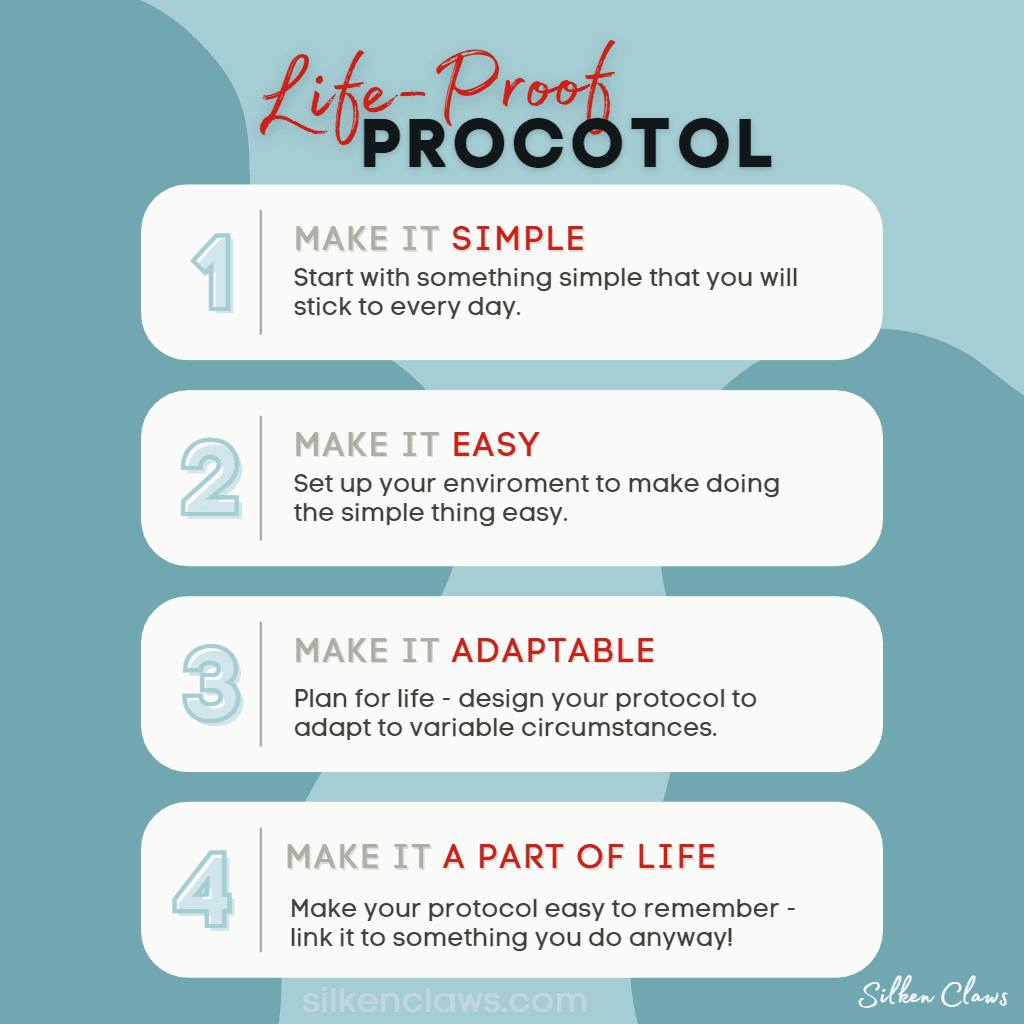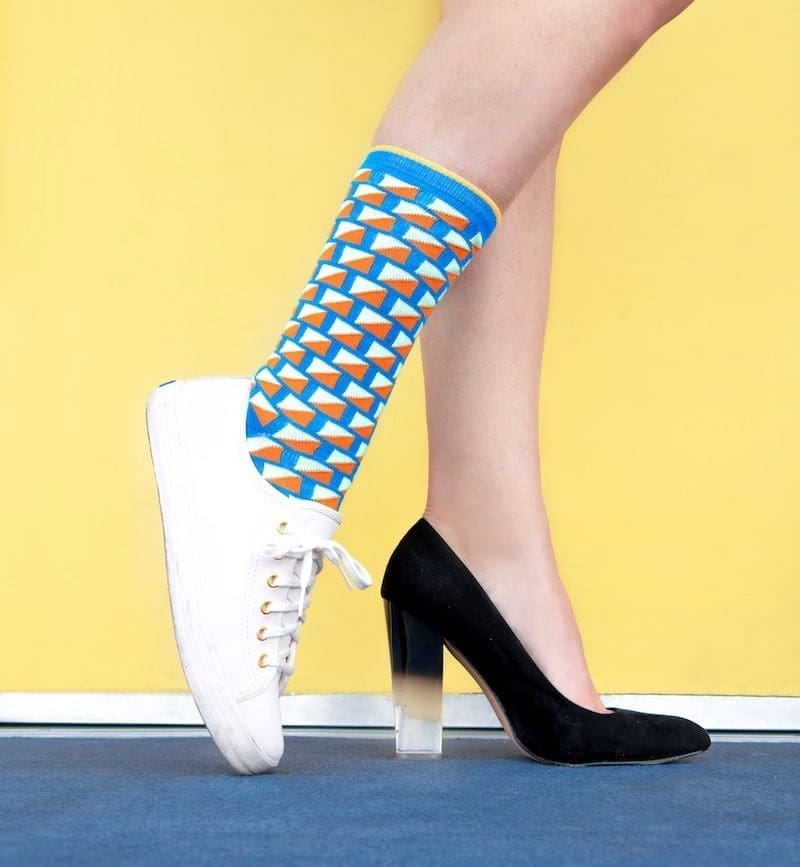
How to set and maintain protocols in a 24/7 dynamic is something I get asked about fairly regularly, so I have written a little guide.
My advice down below is not only based on a decent chunk of experience, but a decent amount of research on the science of behaviour change. So, whether you’re a newbie or a seasoned kinkster, hopefully you’ll find something you can use!
Preliminary Points
I have written an introduction to protocol here, so if you need some clarity on what protocol in BDSM is or how protocol relates to power exchange, do have a read of that.
Please do note that this post, ‘protocol’ will refer to setting medium and low protocol, as defined in my post – high protocol is a separate topic, which is a lot less pragmatic.
Now, all that is out of the way, without further ado, here’s my advice on how to set effective protocols.
Coming to the drawing board: start with your feelings
Right, so, let’s just start with a quick few words for those who are just coming to the drawing board.
While staring at that blank sheet of paper may send fingers flying to the nearest search bar, I would encourage looking in, rather than out. The point of having daily protocol is to easily create that opportunity to connect with your dynamic and through it, your partner. Fundamentally, this isn’t about any act, but rather how you feel.
So, feelings are really the best starting point. Both of you need to think about:
- what makes you feel connected to space;
- what brings out your dominant / submissive instincts, what brings out your partner’s;
- what makes you feel connected to your partner; and
- which needs are you looking to meet through the dynamic?
Have a think – personally, I strongly recommend writing, but then again, I am biased, in that writing is my cup of tea. Then have a chat and see if you can come up with an idea which is a point of connection for both of you, something which pulls at those dominant and submissive feelings in each other.
You don’t necessarily need to come up with an idea in the space of one conversation. But if you keep giving the subject a poke here and there, you should eventually get to some things you both like the idea of integrating into your day. (And if not, it may be that 24/7 is not for you – absolutely nothing wrong with that!)
From the drawing board to prototype protocol
So, you have some ideas – fabulous! The next stage is translating them into something which will integrate into real life.
Everyday protocol needs to be built for the heavy wear and tear of everyday life, so design your prototype accordingly. You won’t (and don’t need to) pre-empt everything, but a little bit of planning can really make a difference between something you will stick to and something which falls by the wayside by next week.

In my experience, to make protocol life proof you have to:
Make it simple
Whether you are new to 24/7 and this is your first attempt at establishing protocol, or whether you’ve fallen out of it and are trying to get back, start small. Studies show that self-efficacy – our belief that we can do something – is a big factor in successfully establishing new habits. And of course, nothing dents self-efficacy like the feeling you are trying and repeatedly failing.
So, pick something simple and start with that – the feeling that you will get successfully sticking to something will add up and help you build on that foundation!
Make it easy
The end goal is to make your protocol a habit – a part of life you automatically do and don’t give a second thought to. It takes about 60 days to form a new habit, so ideally, you want to be as consistent with your protocol as possible. So, make it easy for both of you to follow every day.
Think about the pragmatic aspects of what you’re proposing to do. If you’re going to need any equipment or props, think about where it lives, how accessible it is. Can something be reorganised to make it easier?
Studies show that even a 10 second obstruction can make us more reticent to do something, so organise your space to make performing your protocols as easy as possible.
Make it adaptable
This is the big one. Life has a nasty habit of getting in the way. In the general bustle of adulting, we often find ourselves feeling less than 100%.
Instead of setting unreasonable expectations, design your protocol with this in mind. Really think about how your protocol will actually fit into your life as it looks *right now*, not an aspirational version of how you would like things to be.
What happens if you don’t have time? What happens if you don’t feel exhausted? What happens if you or your partner are stressed, on a deadline, having something on your mind?
These are all important things to consider and if you have answers in advance, you are a lot more likely to stick to what you set out to.
Make it a part of life!
This is the final hurdle – you can have a protocol which is simple, easy to execute, and life proof, but all of that doesn’t matter if you don’t remember to do it. So, make it a part of life!
I would strongly recommend linking the start of the protocol to something which happens anyway – getting home, showering, going to bed, mealtimes. That way, you don’t have to think about finding a separate time for D/s – the protocol becomes embedded within your daily routine.
If you can’t link it to your routine, set up a system to remember. Don’t give yourself extra mental work to do! Set a reminder on your phone. Stick a Post-It by your keys, or store the collar you want to put on your sub next to your phone charger. Remember – integrating protocols into your life is about ensuring they take as little thought as possible.
So, to sum it all up…
So, to sum up, to stick around, protocols should be designed around your specific connection – focus on how you can connect with your feelings and your dynamic. They should be specific, simple, adaptable to your everyday life, and integrated into your routine to use as little mental capacity as possible.
I have another post on maintaining protocol and how to review and keep on top of them in the pipeline, so do keep an eye for that.
Last updated: 04 September 2023





thebarefootsub says:
A really helpful guide here. I imagine it is transferrable to dynamics that are not 24/7?
I’d never considered the feelings… what brings out my submissive instincts is as important as what a dominant would like me to do. (No point a dominant requiring one thing from me if it ignites my top side!) Thought provoking indeed.
Miss Rosalie says:
Thanks! A lot of the above applies to habit formation in general, so I’d imagine whatever your dynamic, it would probably be useful in creating protocol to make connecting with the right head space easier / quicker.
I think it’s easy to lose sight of what makes you feel connected to space in favour of focusing on your partner, especially from the sub side. But when it comes to setting a routine which is supposed to be habitual, it’s really important to design something which pulls at the right feelings.
Glad you found it interesting!
Bob says:
Married in 2002 and my Wife beg and I always be locked by June of 2002. In 2020 she implemented her “Get out of Jail” program eventually becoming my Warden. She requires I earn any unlocking and has me down to about four a year now.
She had me learn about a dozen hand commands she uses. They are convent when out in public.